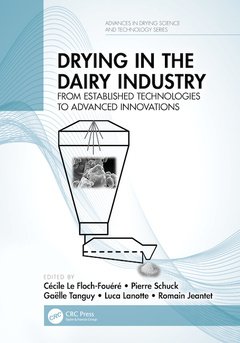Drying in the Dairy Industry From Established Technologies to Advanced Innovations Advances in Drying Science and Technology Series
Coordonnateurs : Le Floch-Fouéré Cécile, Schuck Pierre, Tanguy Gaëlle, Lanotte Luca, Jeantet Romain

With more than 12M tons of dairy powders produced each year at a global scale, the drying sector accounts to a large extent for the processing of milk and whey. It is generally considered that 40% of the dry matter collected overall ends up in a powder form. Moreover, nutritional dairy products presented in a dry form (eg, infant milk formulae) have grown quickly over the last decade, now accounting for a large share of the profit of the sector.
Drying in the Dairy Industry: From Established Technologies to Advanced Innovations deals with the market of dairy powders issues, considering both final product and process as well as their interrelationships. It explains the different processing steps for the production of dairy powders including membrane, homogenisation, concentration and agglomeration processes. The book includes a presentation of the current technologies, the more recent development for each of them and their impact on the quality of the final powders. Lastly, one section is dedicated to recent innovations and methods directed to more sustainable processes, as well as latter developments at lab scale to go deeper in the understanding of the phenomena occurring during spray drying.
Key Features:
- Presents state-of-the-art information on the production of a variety of different dairy powders
- Discusses the impact of processing parameters and drier design on the product quality such as protein denaturation and viability of probiotics
- Explains the impact of drying processes on the powder properties such as solubility, dispersibility, wettability, flowability, floodability, and hygroscopicity
- Covers the technology, modelling and control of the processing steps
This book is a synthetic and complete reference work for researchers in academia and industry in order to encourage research and development and innovations in drying in the dairy industry.
Preface ,1. Spray-Dried dairy products categories, 1.1. Introduction, 1.2. The fundamentals of spray drying process in the production of dairy products, 1.3. Spray-dried dairy powder products, 1.4. Conclusion; 2. Technology, modelling and control of the processing steps, 2.1. Improvement of whey products spray-drying by use of membranes processes, 2.2. Concentration by vacuum evaporation, 2.3. Lactose crystallization for whey, permeate and lactose, 2.4. Homogenization: a key mechanical process in interaction with product to modulate the organization of fat in spray-dried powders, 2.5. Technology, Modelling and Control of the Processing Steps in Spray Drying, 2.6. Agglomeration processes of dairy powders, 2.7. Product Modification in Fluidized Bed Dryer; 3. Powder properties and influencing factors, 3.1. Glass transition and Water activity, 3.2. Caking of dairy powders, 3.3. Whey proteins pre-texturized by heating in dry state, 3.4. Physical properties of spray-dried dairy powders in relation with their flowability and rehydration capacity, 3.5. The microbiology of milk powder processing; 4. Innovations & Prospects, 4.1. Infant and follow-on formulae, 4.2. Lactose Hydrolyzed Milk Powder, 4.3. Properties of non-bovine functional camel milk powder, 4.4. How producing dairy powders without the use of drying chamber?, 4.5. Prediction of spray drying parameters: SD2P® software, 4.6. Spray drying of probiotics: towards a controlled and efficient process; 5. Conclusion - The drying of milk at the laboratory scale: from the industrial need to the scientific challenge, 5.1. Limitations of the drying process at the industrial scale, 5.2. Laboratory investigation of the evaporation in dairy systems, 5.3 Microscopy and microfluidic opportunities for studying the drying of dairy protein droplets
Cécile Le Floch-Fouéré is an assistant professor in the Food Science and Engineering Department AGROCAMPUS OUEST, Rennes, France since 2008. Her primary area of expertise is process engineering and dairy technology at research unit "Science and Technology of Milk and Egg" in Rennes. Cécile received her PhD in 2008 in Biophysics from The University of Rennes 1. Since 2017, she is leader of Spray-drying - Concentrated Matrices - Functionalities team. Her current research focuses on the understanding of the interface formation mechanism during the drying process of food powders. Up to now, Cécile participated to the supervision on 6 MSc and 11 PhD students and co-authored about 30 publications in peer-review journals, 67 conferences and posters, 2 books including 3 chapters.
Pierre Schuck had a Master degree in Food Science and Technology and obtained his PhD in Physicochemistry and Quality of Bio-Products in 1999. He is currently a research engineer at the research unit "Science and Technology of Milk and Egg" at INRAE (French National Research Institute for Agriculture, Food and Environment) in Rennes. Before this academic position, he was in charge of a spray drying equipment in one of the main dairy industrial groups in France. His main interest is spray drying of dairy products with a particular interest for the physical mechanisms of water transfer and for the influence of the physico-chemical parameters before, during and after spray drying on the properties of the dairy powders. His expertise is well recognized in the field and Dr P. Schuck is referred to as consultant in many dairy industries in the world. His scientific contribution led to 116 papers in peer-reviewed journals, 112 conferences and posters, 7 Patents - 37 Licences, 11 Books and 26 Book Chapters.
Gaëlle Tanguy is working as a research engineer at INRAE (French National Research Institute for Agriculture, Food and Environment), in the dairy processing team of the
Date de parution : 11-2020
17.8x25.4 cm
Thèmes de Drying in the Dairy Industry :
Mots-clés :
Dairy Powders; Lactose Crystallization; skim milk powder; BMED; process/Product interactions; Spray Drying; drier design and operational parameters; Bm; Interfacial Dilational Rheology; vacuum evaporation; Acid Whey; modelling and control; Whey Protein Powders; Infant milk formula; Moisture Content; Homogenization; Whey Powders; Powder properties; Powdered Infant Milk Formula; Dairy industry; Cream Powder; NF Membrane; Water Sorption Isotherm; Amorphous Lactose; Structural Relaxation Times; Water Sorption; VCF; Caseinate Powders; Drying Chamber; Buttermilk Powder; Dilute Phase Conveying; Milk Powders; Sweet Whey; Cheese Powder



